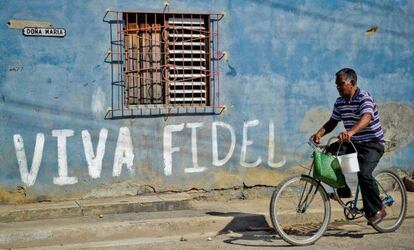Fidel’s diplomatic routine
Even as he turns 88, the Cuban leader continues to watch over the island’s economic liberalization


Fidel Castro inspires aversion or idolatry, but never indifference. The communist leader who turned 88 years old on Wednesday now dedicates himself to the study of the evils of humanity, diplomacy and the development of the fishing and farming industries in Cuba. When he can, or when he wants, he receives foreign dignitaries and those in his confidence. And he does not block the socio-economic liberalization program that his brother Raúl began in 2011 because, if he were to object, the process would be impossible to accomplish. Fidel Castro does not follow the small print of the reform measures because his medical staff do not let him, but he is aware of the important decisions, none of which threaten the hegemony of the Communist Party. The party took power in 1959 after Castro’s guerrilla army triumphed in the Sierra Maestra. Cuban revolutionaries still venerate their caudillo as much as some Cuban exiles hate him. They blame their departure on the current system, which they find incompatible with pluralism and freedom.
Their perspective is not new. Yet, this controversial and iconic leader still moves people when he makes a surprise visit to a cooperative, farm, art gallery or peasant community and shows interest in their activities. “He was a meter away from me and he is more lucid than you and me,” the young director of the national cooperative organization said in April.
The decentralizing measures would have been impossible to implement if Fidel had objected or vetoed them
Party leaders who talked to Castro or knew of his surprise visits to places around Havana spoke of him with devotion. During a conversation with EL PAÍS in Artemisa Province last month, they talked about his patriotic dedication and his constant protection. They said Fidel was lucid and sure of himself, that he showed no signs of delirium. He had presence of mind and body despite the fact that he is old and stooped over.
But every birthday becomes a curse and a disgrace for those in Cuba and abroad who want him dead and only find swear words to describe one of the most important personalities of the 20th century, who figured prominently in the Cold War and in revolutions in the third world. Since 2006 when he left the offices of the Palacio de la Revolución after suffering from stomach pains that almost killed him, the government has not published anything about his personal, family or medical routine. Very little has been said about his meetings with advisors on Obama, Europe, Putin, Ukraine, or on the country’s stock of laying hens.
“Fidel Castro has had and still has a fundamental role in the revolution,” Ricardo Alarcón told EL PAÍS during a recent trip to Madrid. Alarcón is a former member of the Communist Party politburo, ex-president of parliament and a man once considered the regime’s number three. When asked if the current president consults his older brother, Alarcón said: “They love each other very much. And as Raúl has said, the commander-in-chief must be consulted on all the fundamental matters.”
He was a meter away from me and he is more lucid than you and me”
Whether Alarcón’s words are true, false or a mixture of the two, the decentralizing measures Raúl Castro approved while maintaining total resistance to political change would have been impossible to implement if Fidel had objected or vetoed them. In the late 1980s, the commander-in-chief objected to certain measures during the turbulent disintegration of the Soviet Union when a minister and party leaders suggested joining the glasnost and perestroika initiatives.
When in 1993, an economic crisis threatened to wipe Cuba out, Castro agreed to liberalize the economy under one condition: “reforms without capitalism.” He studied China and Vietnam where the Communist Party loosened its iron grip while maintaining power and in 2010 he told the American journalist Jeffrey Goldberg “our model no longer works, not even for us.”
There were no official events to mark the 88th birthday of the man who was the main figure in the Bay of Pigs Invasion and the Cuban Missile Crisis, and has survived multiple assassination attempts. Castro continues to watch over the country as the government changes its economic model to stay afloat while maintaining control of 80 percent of the nation’s productive output. The historical agitator holds diplomatic events, receives the presidents of Cuban allies such as China and Russia, and talks to journalists and intellectual friends, confessing the deep sadness he felt when two of his best friends – Gabriel García Márquez and Hugo Chávez – died.
Translation: Dyane Jean François
Tu suscripción se está usando en otro dispositivo
¿Quieres añadir otro usuario a tu suscripción?
Si continúas leyendo en este dispositivo, no se podrá leer en el otro.
FlechaTu suscripción se está usando en otro dispositivo y solo puedes acceder a EL PAÍS desde un dispositivo a la vez.
Si quieres compartir tu cuenta, cambia tu suscripción a la modalidad Premium, así podrás añadir otro usuario. Cada uno accederá con su propia cuenta de email, lo que os permitirá personalizar vuestra experiencia en EL PAÍS.
¿Tienes una suscripción de empresa? Accede aquí para contratar más cuentas.
En el caso de no saber quién está usando tu cuenta, te recomendamos cambiar tu contraseña aquí.
Si decides continuar compartiendo tu cuenta, este mensaje se mostrará en tu dispositivo y en el de la otra persona que está usando tu cuenta de forma indefinida, afectando a tu experiencia de lectura. Puedes consultar aquí los términos y condiciones de la suscripción digital.








































